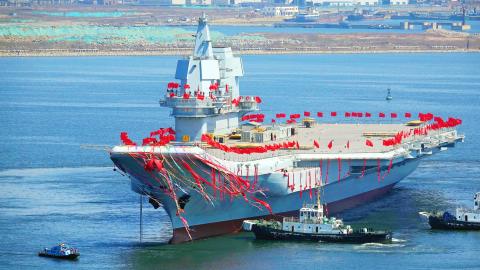The launch of China’s first domestically built aircraft carrier on Wednesday has prompted yet another flurry of review of viable Taiwanese counters, with the Ministry of National Defense (MND), legislators and academics all agreeing that missile range development and submarines should be sufficient to counter latent threats posed by the 001A carrier.
The 001A, the official name of which is yet unknown, shows that Beijing’s efforts to build a blue water navy are an unstoppable trend, and that China seeks to protect its national interests in the South China Sea, officials said on Wednesday.
However, MND officials said that, should it prove necessary, the Taiwanese navy is capable of ensuring the safety of the nation through the “layered defense” provided by Hsiung Feng III anti-ship missiles and the submarine fleet.

Photo: AFP
The comment on submarines refers to the navy’s plans to manufacture its own submarines, with the first batch scheduled to be in service after 2025.
According to Democratic Progressive Party Legislator Tsai Shih-ying (蔡適應), the reverse-engineering of the 001A from the Liaoning proves that the Chinese are now capable of manufacturing carriers.
With ample funding to sustain and maintain a carrier battle group, even if Chinese carriers were behind those of the US by one to two generations, they would still be able to delay US military aid coming to Taiwan, Tsai said.
However, Chieh Chung (揭仲), a research fellow at the National Policy Foundation, a Chinese Nationalist Party (KMT) think tank, said that while the launch of the 001A carrier shows that China’s shipbuilding technology has improved, the ship’s combat capabilities might not yet be better than those of the Liaoning.
Although the 001A has superior hardware, equipment and deck size compared to the Liaoning, it still employs a ski-jump takeoff ramp, not catapult launchers, to launch jets, which limits the ship to anti-air duty within the battle group, Chieh said.
Airborne early warning and control, and anti-submarine functions would still be performed by helicopters, Chieh said.
Meanwhile, Tsai said that the nation’s missile arsenal was made up mostly of short to mid-range defensive missiles, and the MND should not focus on acquiring more defensive weaponry in future purchases and research.
Taiwan must also acquire weaponry that is capable of offensive actions, Tsai said.
The Chung Shan Institute of Science and Technology could build on the Hsing Feng III missiles and research long-range missiles —with a range that exceeds 1,000km — that are capable of precision strikes, he said.
Only through such weaponry would Taiwan be able to present an effective deterrent to China and prevent it from resorting to armed invasion, he added.
The Chinese aircraft carrier program is still in its infancy, National Chung Hsing University Graduate Institute of International Politics professor Tsai Ming-yen (蔡明彥) said. adding that its capability to conduct strikes are as yet not fully developed, while the ship is still vulnerable to anti-submarines and anti-missile defenses.
The nation should focus on its missile development and on its project to domestically build submarines, as well as develop missile-boat platforms, Tsai Ming-yen said.
The nation should especially invest in enhancing the precision strike capabilities and increasing the destructive force of its missiles, he added.

Taiwan is stepping up plans to create self-sufficient supply chains for combat drones and increase foreign orders from the US to counter China’s numerical superiority, a defense official said on Saturday. Commenting on condition of anonymity, the official said the nation’s armed forces are in agreement with US Admiral Samuel Paparo’s assessment that Taiwan’s military must be prepared to turn the nation’s waters into a “hellscape” for the Chinese People’s Liberation Army (PLA). Paparo, the commander of the US Indo-Pacific Command, reiterated the concept during a Congressional hearing in Washington on Wednesday. He first coined the term in a security conference last

Prosecutors today declined to say who was questioned regarding alleged forgery on petitions to recall Democratic Progressive Party (DPP) legislators, after Chinese-language media earlier reported that members of the Chinese Nationalist Party (KMT) Youth League were brought in for questioning. The Ministry of Justice Investigation Bureau confirmed that two people had been questioned, but did not disclose any further information about the ongoing investigation. KMT Youth League members Lee Hsiao-liang (李孝亮) and Liu Szu-yin (劉思吟) — who are leading the effort to recall DPP caucus chief executive Rosalia Wu (吳思瑤) and Legislator Wu Pei-yi (吳沛憶) — both posted on Facebook saying: “I

The Ministry of Economic Affairs has fined Taobao NT$1.2 million (US$36,912) for advertisements that exceed its approved business scope, requiring the Chinese e-commerce platform to make corrections in the first half of this year or its license may be revoked. Lawmakers have called for stricter enforcement of Chinese e-commerce platforms and measures to prevent China from laundering its goods through Taiwan in response to US President Donald Trump’s heavy tariffs on China. The Legislative Yuan’s Finance Committee met today to discuss policies to prevent China from dumping goods in Taiwan, inviting government agencies to report. Democratic Progressive Party Legislator Kuo Kuo-wen (郭國文) said

Sung Chien-liang (宋建樑), who led efforts to recall Democratic Progressive Party (DPP) Legislator Lee Kun-cheng (李坤城), was released on bail of NT$80,000 today amid outcry over his decision to wear a Nazi armband to questioning the night before. Sung arrived at the New Taipei District Prosecutors’ Office for questioning in a recall petition forgery case last night wearing a red armband bearing a swastika, carrying a copy of Adolf Hitler’s Mein Kampf and giving a Nazi salute. Sung left the building at 1:15am without the armband and covering the book with his coat. Lee said today that this is a serious